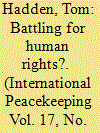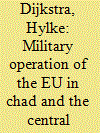|
|
|
Sort Order |
|
|
|
Items / Page
|
|
|
|
|
|
|
| Srl | Item |
| 1 |
ID:
099171


|
|
|
|
|
| Publication |
2010.
|
| Summary/Abstract |
The achievement of the objectives of international security, peacekeeping operations and peace enforcement, like the operations in Iraq and Afghanistan after the initial invasions, and of unilateral security operations, like those in Chechnya, Lebanon and Gaza, is often threatened by high levels of civilian casualties and physical destruction. Much of this is legitimized under the laws of armed conflict, notably the principles of legitimate military objectives and collateral damage, but would be contrary to human rights standards. This article argues that the claim that the laws of armed conflict and human rights are complementary is misleading and that international and national security, peacekeeping and peace-enforcement operations designed to protect and promote human rights should in principle be conducted under human rights standards. It explains how this could be achieved for international operations conducted under the auspices of United Nations Security Council Resolutions and/or status-of-forces agreements.
|
|
|
|
|
|
|
|
|
|
|
|
|
|
|
|
| 2 |
ID:
099176


|
|
|
|
|
| Publication |
2010.
|
| Summary/Abstract |
The obligations of the 'international community' in the face of humanitarian catastrophe are deeply vexed. In such cases, 'global public opinion' sometimes looks favourably on the use of force to save strangers, also articulated as a global 'responsibility to protect'. For better or worse this view is rarely reflected in decisions of the Security Council. The argument in this article is that the deployment of InterFET in East Timor in September 1999, and events preceding it, showed that humanitarian intervention is a doctrine unlikely to be employed without the consent of the 'target' state. It shows that while decision-makers are influenced by normative concerns, such as the imperative of saving lives, respect for national sovereignty continues to take primacy in an anarchical global society. The processes surrounding coerced consent, such as coalesced in the East Timor case, bear close examination for their potential to influence state behaviour, and thereby assist UN member states to avoid war and save strangers.
|
|
|
|
|
|
|
|
|
|
|
|
|
|
|
|
| 3 |
ID:
099178


|
|
|
|
|
| Publication |
2010.
|
| Summary/Abstract |
This article evaluates the military operation of the European Union in Chad and the Central African Republic in 2008-09. Despite a promising conceptual approach and close cooperation with the United Nations (UN), the operation created significant political problems between member states. It led to a split - France arguing that it carried too much of the burden and Germany and the United Kingdom sensing that they were sponsoring a pet project. When the UN failed to achieve its ambitious promises to establish a parallel presence and follow-on force, tensions arose with the UN as well. This type of operation is therefore unlikely to be repeated in the near future.
|
|
|
|
|
|
|
|
|
|
|
|
|
|
|
|
| 4 |
ID:
099172


|
|
|
|
|
| Publication |
2010.
|
| Summary/Abstract |
This article focuses on emerging patterns of inter-organizational cooperation in peacekeeping missions in Africa - between the United Nations, the African Union and the European Union. The overwhelming majority of current operations build on some kind of inter-organizational arrangements. At least three forms of cooperation have emerged on the continent, of which sequential, parallel and integrated deployment of troops are the dominant forms. Based on rational and sociological institutionalist approaches, the article explains the selection of cooperation types by international organizations, by exploring the conditions that trigger the selection of a certain form of cooperation.
|
|
|
|
|
|
|
|
|
|
|
|
|
|
|
|
| 5 |
ID:
099182


|
|
|
|
|
| Publication |
2010.
|
| Summary/Abstract |
Soldiers' self-images undoubtedly influence the way they recognize, perceive, plan and conduct their tasks. The article examines the self-image of Swedish peacekeepers in the UNMIL mission in Liberia and the UNMIK mission in Kosovo. The findings are based on interviews with 27 soldiers before, during and after deployment. Eleven dimensions of self-image were found, showing that the self-image refers almost entirely to the peacekeeping and not the war-fighting role. In addition, the Swedish soldiers hold themselves to be excellent peacekeepers. Departing from this observation, we discuss three dilemmas in peacekeeping that have implications beyond the Swedish armed forces. The argument is that being less self-referential may make peacekeeping more successful.
|
|
|
|
|
|
|
|
|
|
|
|
|
|
|
|
| 6 |
ID:
099174


|
|
|
|
|
| Publication |
2010.
|
| Summary/Abstract |
International actors involved in transitional post-conflict situations often focus their attention on the reconstruction of a state's political apparatus. Even where control of natural resources is central to the conflict, there tends to be less consideration of resource governance issues in transitional periods. This article examines one particular aspect of resource governance - the negotiation and signing of foreign investment contracts - in the context of post-conflict, pre-election Liberia. The investment contract process was mishandled by the transitional Liberian government. Although local interests resisted external oversight, international actors could and should have done more, in the interest of all Liberians, to proffer contract negotiation expertise and to prevent the transitional government from locking the state into unsatisfactory deals on major resource assets. International actors did address the contract issue and external oversight of economic governance more generally during Liberia's formal transitional period, but ultimately their interventions amounted to too little and they came too late.
|
|
|
|
|
|
|
|
|
|
|
|
|
|
|
|
| 7 |
ID:
099173


|
|
|
|
|
| Publication |
2010.
|
| Summary/Abstract |
The war that ravaged Liberia between 1989 and 2003 had myriad causes and belligerents, but there can be little question of the demographic cohort that provided the manpower for the war machine: youth. Young, disconnected Liberians became easy recruits to the conflict's warring factions as they sought a sense of importance and independence away from the cultural background that marginalized them. Building on qualitative field research in Liberia, this article bridges its primary case study with theory and secondary data, to examine the threat of post-war re-marginalization and disengagement of youth in the country. The article argues that economic reintegration programmes have not addressed issues of youth empowerment directly enough, and that targeted political and social engagement strategies from a vertical and horizontal integration perspective would be more effective in the re-engagement of youth in civilian life.
|
|
|
|
|
|
|
|
|
|
|
|
|
|
|
|
|
|
|
|
|